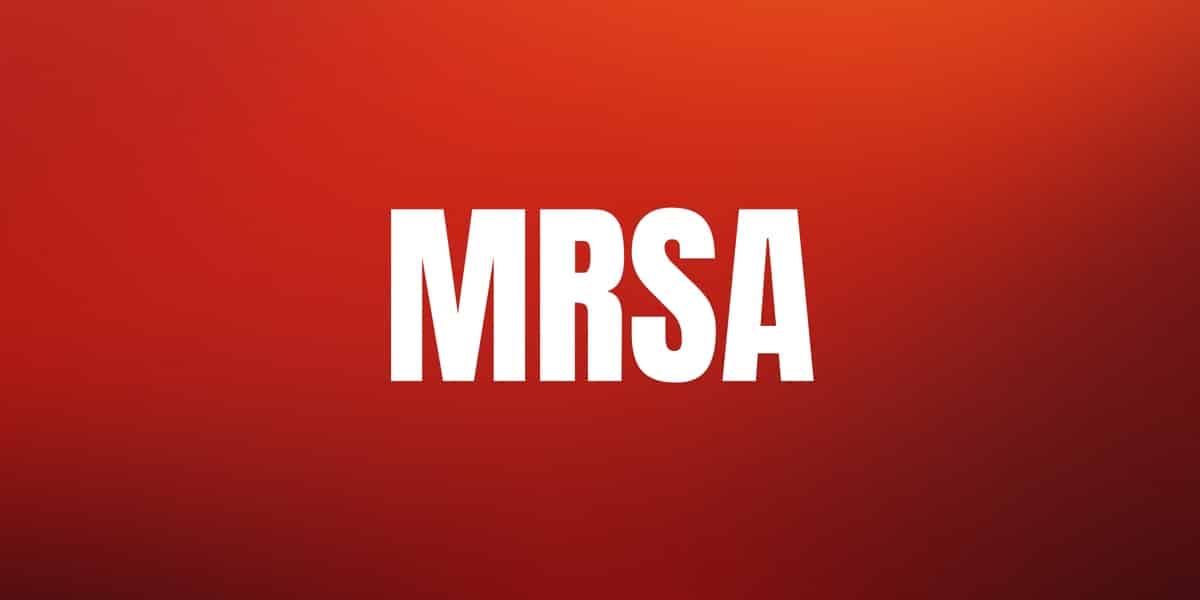Methicillin-resistant Staphylococcus aureus (MRSA)--an antibiotic-resistant strain of staph--is a deadly bacterium responsible for the deaths of more than ten thousand people per year.
MRSA in the Community
MRSA is spread via direct contact, either skin-to-skin or skin-to-surface, and can potentially lead to serious complications, including:
- Skin infections.
- Pneumonia.
- Sepsis, and;
- Death
MRSA is carried by approximately two in every one hundred people, though most are not infected, and is typically spread in one of two environments--healthcare, which is on the decline, and within communities--commonly referred to as Community-Associated MRSA, or CA-MRSA--which is unfortunately on the rise.
According to WebMD;
Alarmingly, MRSA is also showing up in healthy people who have not been hospitalized.
This type of MRSA is called community-associated MRSA, or CA-MRSA.
CA-MRSA skin infections have been identified among certain populations that share close quarters or have more skin-to-skin contact.
Examples are team athletes, military recruits, prison inmates, and children in daycare.
But more and more CA-MRSA infections are being seen in the general community, especially in certain geographic regions.
CA-MRSA is also more likely to affect younger people.
A recent example of the seriousness of MRSA was observed during the emergency response by five public schools in Palm Beach, Florida.
According to the Sun-Sentinel;
Palm Beach County School officials on Tuesday said two more schools — John I. Leonard High School in Greenacres and Roosevelt Elementary School in West Palm Beach — will be scrubbed and sanitized after a person with a suspected case of the contagious MRSA infection visited the schools.
In the last week, crews also have scrubbed and sanitized three other Palm Beach County schools after someone who visited or worked at them was diagnosed with MRSA.
5 Palm Beach County schools sanitized after people with MRSA visited campuses
While MRSA treatment can, unfortunately, be very invasive and involve long-term hospitalization and medical care, preventing MRSA is relatively easy.
MRSA Cleaning & Prevention
Many commercial or household cleaning products are rated as sanitizers, which reduce the presence of germs and bacteria, including staph, but are not considered effective at killing MRSA.
To effectively combat the spread of MRSA in offices, schools, and healthcare environments, a combination of cleaning, disinfecting, and hand-hygiene is required.
- Step 1. Implement and enforce proper hand washing practices that include scrubbing the hands, top and bottom, between the fingers, as well as the nails, before eating, after using the restroom, and before and after handling or preparing food, but especially after cleaning and disinfecting.
- Step 2. Regularly and thoroughly clean all surfaces prior to applying a disinfectant.
- Step 3. Disinfect with a hospital-grade disinfectant such as a 10% solution of bleach and water.
- Step 4. Observe and adhere to the required laytime to kill MRSA--typically five minutes with a 10% bleach solution--before wiping up.
- Step 5. Safely dispose of all dirty water and used cleaning product.
- Step 6. Thoroughly launder or safely bag and dispose of all clothing and protective equipment worn during the cleaning process, as well as rags, towels, and mop heads.
Keep in mind that MRSA is a bacterium and can spread rapidly, making it imperative that:
- A full three-dimensional cleaning and disinfection procedure is performed, including around and under desks, chairs, and tables, as well as deep in crevices.
- Cross-contamination is prevented through the use of color-coded microfiber and the two-bucket method--all of which should be changed out for each new room, and;
- Routine germ hot spot wipedowns are performed regularly.
To accomplish this, we highly recommend the professional use of an electrostatic disinfection appliance that uses state of the art technology to safely apply electrostatically-charged disinfectant (the charged particles are attracted to each other allowing for complete surface coverage, making it perfect for hard to reach/clean areas) to any surface, including electronic equipment, gym equipment, and furniture.
References & Resources
- Florida Schools React To Potential MRSA Outbreak
- Methicillin-resistant Staphylococcus aureus (MRSA)
- How to disinfect, clean and kill MRSA
- Facts About MRSA Bacteria
- Clean And Disinfect To Prevent MRSA
Takeaway
MRSA is a deadly infection that can spread rapidly, even in presumably clean environments.
The difficulty and dangers involved with its removal mandate the use of trained, skilled, and dedicated custodial teams armed with the appropriate cleaning and disinfection products and equipment.
Due to the rise in instances of CA-MRSA, an increase in the standards and quality of cleanliness and hygiene in public places is the only method to ensure the safety and health of our children and other at-risk groups.
Outsourcing to an experienced and dedicated service provider is a proven method for cost-effectively ensuring the highest standards of cleanliness are consistently adhered to.
Contact us today and discover why Vanguard Cleaning Systems® is the Standard of Clean® for businesses throughout Northwest Arkansas, Missouri, and Oklahoma.
In Oklahoma, dial 918-960-4450
In Arkansas, dial 479-717-2410
In Missouri, dial 417-812-9777


